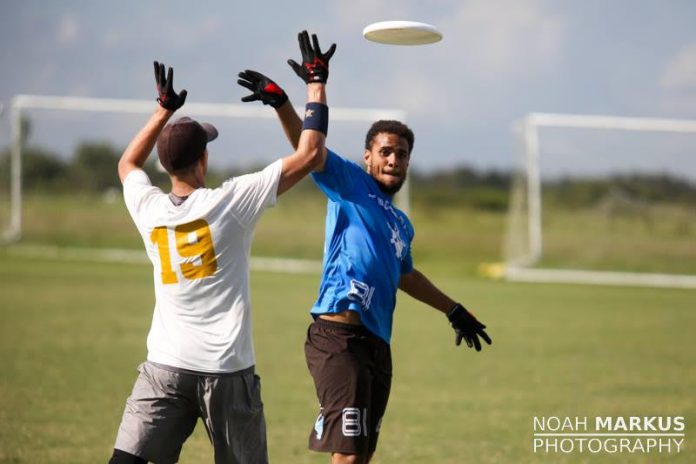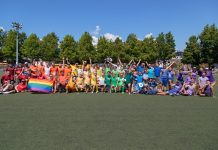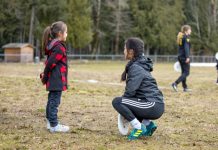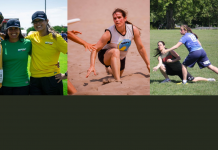Ultimate Canada Magazine
Written by: Britney Griffiths
Cover photo credit: Noah Markus
Black History Month was proposed by Carter G. Woodson in 1926 with the goal of encouraging “people of all ethnic and social backgrounds to discuss the Black experience”. The House of Commons officially recognized February as Black History Month in December 1995. At Ultimate Canada we would like to take this opportunity to share and promote interviews with some of the great athletes in our community. Adrian Yearwood, Braedan Robinson and Matt Colphon all took time out of their busy lives to share their experiences as members of the Canadian ultimate community!
Ultimate Canada: What captured your interest when you first started playing ultimate?
Adrian Yearwood: The first thing that captured my interest when I started playing ultimate was the culture, and by extension, the people. I came from a soccer background, and though I loved (and still love) the game, the culture that surrounded my team and league was extremely toxic to me. I was starting to dread having to actually go and play, and though I didn’t understand it at the time it was the win-at-all-costs, us vs. them mentality that was the source of all that stress and anxiety. I would be friendly to opposing players and get berated for being uncompetitive and weak. I’d try to avoid gratuitous contact and injury and be called soft. I was also a national level gymnast at the time so I knew I belonged in terms of athleticism and skill, but I internalized these things and started to think that maybe competitive team sports just weren’t for me. But then I went and played on a juniors ultimate team (DIRT) the summer after I graduated high school and everything changed. I went from feeling like an impostor to feeling confident and excited to play and practice. My instinct to be a fierce but gracious competitor was not only tolerated but encouraged. And the small, tight-knit community was welcoming in a way that I had never experienced before. Very very cool.
Secondly, the disc itself was wild to me. I became instantly obsessed with the creativity of throwing a disc, and all the small variables that radically change the way it flies.
Braedan Robinson: The first time I played ultimate was after I discovered my highschool had a team, which progressed into playing for a touring team that summer (W.A.T.E.R). What captured my interest was the overall vibe in the ultimate community. Ultimate has a lot of great people that love the game so it’s competitive but also a fun time to be on the field. After all my years of playing, I’ve made tons of friends and every tournament is like a reunion where we can catch up and also show off how much we’ve improved.
Matt Colphon: Ultimate first captured my interest because it was a bit of a niche sport. As a kid I was not athletic, so breaking into the ‘regular’ sports like soccer or basketball seemed out of touch not least because the communities felt tight knit. In contrast, ultimate placed a lot of emphasis on Spirit of the Game and created an atmosphere that was pretty accepting for someone with questionable coordination.
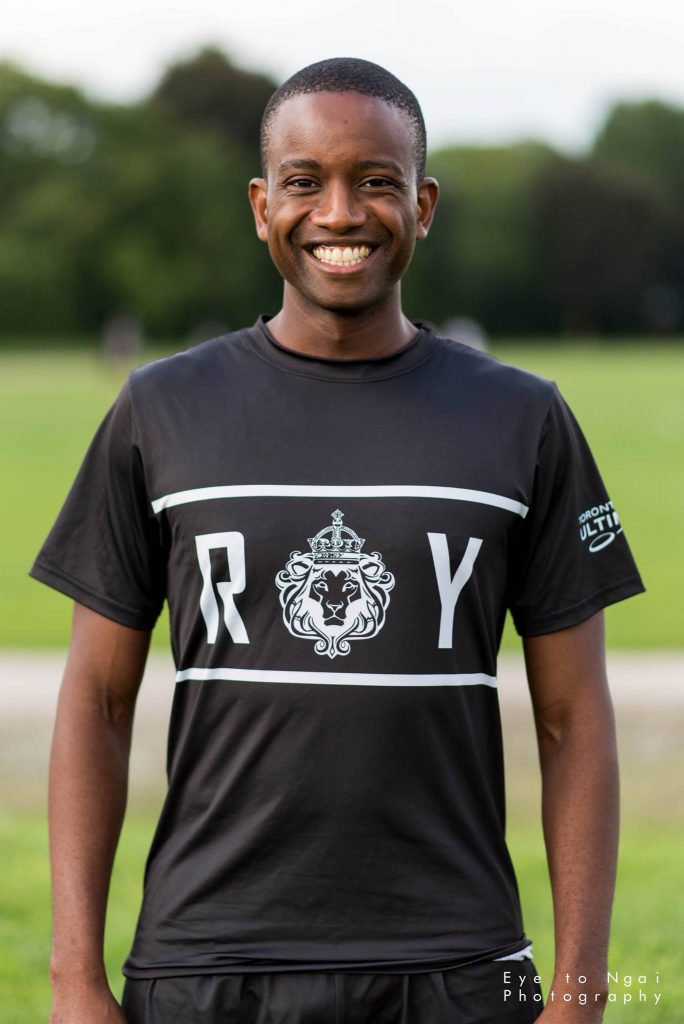
Ultimate Canada: How would you describe your experience as a Black person in the ultimate community?
Adrian Yearwood: This is an interesting question for me specifically, because I had the extraordinary privilege of not really ever thinking of myself as a Black person in the ultimate community until quite recently. I credit this to my own privileged and in many ways sheltered upbringing, but also to the community and teams I have belonged to who have never given me cause to think any differently. The only thing that has changed recently is that I’ve gotten older and recognized my role as a mentor to younger players. This has forced me to acknowledge that I am a POC and that I have an opportunity to play an important role in helping those who haven’t been as fortunate or privileged as I have.
Braedan Robinson: Coming from a sports background of basketball and football where it is more common to see people of colour, I could take a look around and quickly realize I am a minority. On past teams I have played for, I would say there were no more than 3 POC on the team. As obvious of a difference as it is, I have to say I have been truly blessed to be in situations where my skin colour has not caused me any harm. Again, I think that has to do with the spirit of ultimate where the sport brings people together instead of tearing us apart.
Matt Colphon: I’ve had a great experience in the ultimate community, in part because my colour hasn’t been a defining characteristic of my experience. While I do wish the community had more visible diversity – I’m always one of a handful of dark-skinned players at even the largest tournaments – I’ve been happy that it hasn’t had much impact on my enjoyment of the sport.
Ultimate Canada: Since you started playing, would you say there’s been an increase in popularity for the sport in the Black community? What can we do to increase interest?
Adrian Yearwood: I would say no, but I also have my own problems with the term the “black community”. What is that? Do black folks in Atlanta, Toronto, Vancouver, and California belong to the same community? Maybe in the same way that there is an “asian community” or a “european community”, which is to say loosely yes but mostly no. What I’m getting at is that I think it has to start at the micro level. Don’t think of increasing interest in “the black community” in the collective sense; rather, think of increasing interest in black communities. Identify primarily black communities and get ~20 Ultrastar discs into the hands of every gym teacher in every middle / high school in the area. Provide resources (workshop series, teaching materials, drills, highlight packages, etc.). Hire elite black players and coaches to help execute these programs. Make it look professional, flashy, and cool (Ultimate Canada banners, swag to give away, prizes to be won, merch to sell, etc.).
Braedan Robinson: Absolutely, I think overall the sport is becoming more popular and it is very welcoming to multi-sport athletes. Soccer, basketball, volleyball, and football players give it a try and find themselves falling in love with a new sport. The main issue is there are plenty of mainstream sports that catch the attention of children at a young age, while ultimate still hasn’t hit the mainstream level of sport. One thing to increase interest is continue to grow the sport and advertise it! The AUDL has done a great job of highlighting the exotic levels of athleticism and skill then posting on social media which is bound to be shared and viewed by many. If Ultimate Canada continues to grow, through hiring photographers/videographers, paying for advertisements, and displaying the awesomeness of Ultimate, there’s no way it won’t catch interest.
Matt Colphon: From what I see on a regular basis there hasn’t been a big lift in popularity. While there are certainly black players in many leagues and competitive teams, most of the time you see just one or two of us. In order to increase interest long term, I think that we need to continue outreach at the junior level, and put specific emphasis on reaching out to a broader number of communities. That’s where we’ll have the greatest chance at influencing prospective players who are still trying to find what best suits them.
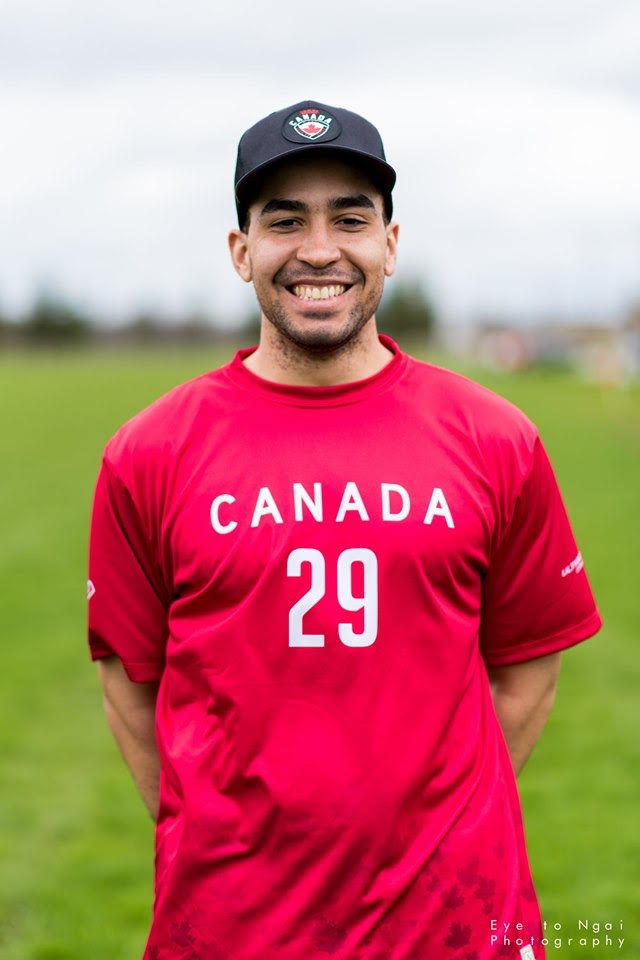
Ultimate Canada: From your perspective, how could leadership better create/foster an environment where a player felt safe discussing a situation of inequity or racism?
Adrian Yearwood: This is a very tough question because I don’t think there’s a one-size-fits-all solution to this problem. My instinct is to say that every team should form (either by appointment or election) a committee of 3-5 people + 1-2 alternates (in case a situation involves 1 or more committee members) whose job it is to hear and address these situations. This would probably require Ultimate Canada to invest in creating a resource module (a la spirit of the game / rules quizzes) that all committee members are required to complete prior to the start of a season that gives them tools to deal with these situations. I don’t know how one resource module could possibly equip someone to deal with every situation, but leadership’s role would be to a) impress upon these committees the importance of their job and b) encourage the other players that the resource is available to them and that they will be heard and taken seriously.
Braedan Robinson: It starts with being open and willing to listen to what anyone on the team has to say. That will help create an environment where people can feel comfortable to speak up. Whether it’s play suggestions, or a situation of inequity, it is important that the team leadership treats everyone with respect and in turn they earn the players’ trust.
Matt Colphon: I think that the best way to create an environment where people feel safe discussing racism and other forms of inequity is to create a space where leadership listens first, and then takes concrete action. It can be hard to speak up, even in one on one settings, when it gets met with lip service or a desire to jump to solutions before understanding concerns. I think the key to leaders encouraging good discussion at any level is to spend more time listening without judgement, then acting in concrete ways, even at a small scale.
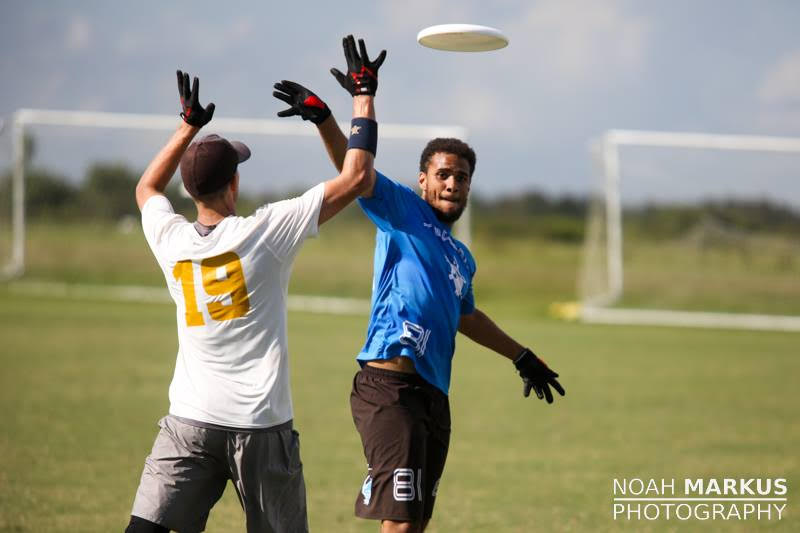
Ultimate Canada: Who is someone you admire you admire/look up to in ultimate?
Adrian Yearwood: I’ve always admired former GOAT captains John Hassell and Andrew Ouchterlony for their incredibly competitive but laid-back leadership style. They had the competitive fire, but it was a smoulder rather than a blaze. This resonated so strongly with me as it’s exactly the same way that I always was and aspired to be, and I think the example that they set had a strong impact on the leader that I’ve become today.
Braedan Robinson: Two people in particular stand out to me, Marques Brownlee and Rowan McDonnell. I admire Marques because not only is he a champion of the ultimate domain, but he is also a high quality youtuber where he does what he loves to do, review Technology. Check him out: MKBHD. Rowan is an absolute beast on the field. He trains harder than everyone so he can be better than everyone which is why he was the MVP in 2018. He is also making some noise on youtube with ultimate training videos: Rowan McDonnell. I look up to these two because they are examples of “the grind paid off” but they don’t quit and they continue to push themselves never settling for anything but greatness.
Matt Colphon: I’ve always admired the people who build the community from the ground up. If I had to call someone specific out I’d say Andrew and Aline Portwine at the Waterloo Organization of Disc Sports. Along with an army of other board members and volunteers, they’ve run dozens of tournaments from local weekend events to international championships, and have collected hundreds of discs and pairs of cleats to help developing programs in other parts of the world. Most importantly they’ve always had a view of propagating the sport and creating a good experience for everyone involved. There are countless people like them that make the ultimate community the welcoming place that it is for people at all levels of the sport.
We would like to extend our sincerest thanks to our interviewees and encourage you all to seek out more opportunities to learn about the experiences, achievements and contributions of Black Canadians in our society!
Black Lives Matter Canada Syllabus from the Black Lives Matter Canada webpage.
